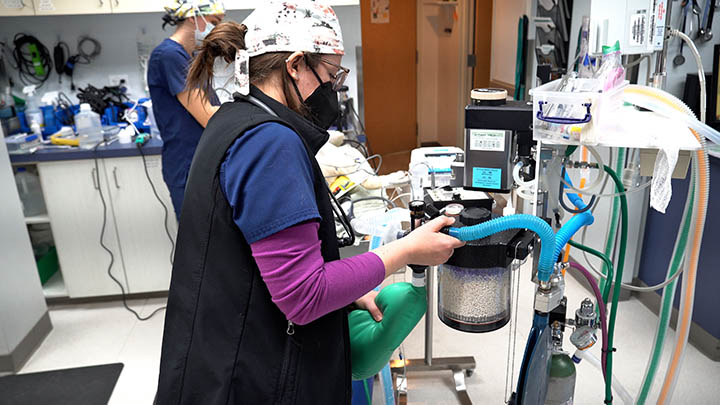Pain Management for Surgical Patients

Pain Management for Surgical Patients
A question that we are often asked regarding patients scheduled for surgery is: “Will my pet be receiving any pain medication?” The short answer is an emphatic, yes!
We take pain management very seriously at the Veterinary Referral Center of Central Oregon. Regardless of the reason your pet is with us, such as an emergency visit after a traumatic injury or a planned surgery, appropriate pain management is of paramount importance to us. Any patient that undergoes any type of surgical procedure will receive pain control before, during, and after surgery. We implement a variety of progressive anesthetic and pain management techniques, commonly referred to as a “multimodal anesthetic approach.” This means that we use a combination of pain control techniques, specific to each patient with the goal of providing pain control and minimizing side effects common associated with pain medications, such as dysphoria.
First and foremost, since our pets can’t speak up when they are hurting, veterinary professionals need to be able to read body language and interpret vitals signs for varying species. Even a pet’s personality must be considered when assessing pain. The staff at VRCCO are all thoroughly trained to accurately assess pain on all pets we treat.
Before surgery, each patient receives injectable pain medication. These injections last anywhere from 2-6 hours, depending on which medication is used. Depending on the procedure, patients may also receive an epidural or a local nerve block. These types of pain management provide an additional 4-24 hours of pain control, specific to the region being operated on. We recently began using a new medication for dogs undergoing knee surgeries. It’s a long acting local anesthetic that provides up to 72 hours of postoperative pain management.
Our standard is for any patient that has undergone a major surgical procedure to stay at least one night with us. These patients are kept on intravenous fluids and benefit from intravenous pain management. Most commonly, we control pain through CRI’s – constant rate of infusions. This means that patients are continuously receiving pain medication that is dosed specific to their weight. Dosages for constant rate of infusions are easily adjusted, depending on the patient’s pain levels. CRI’s may be started before, during, or immediately after surgery.
Typically once a patient is eating, we will begin to transition them from intravenous medications to oral medications. Oral medications may include opioids, NSAIDS (non-steroidal anti-inflammatories), or medications for nerve pain. Patients that are difficult to administer oral medications to may be eligible for a pain patch, which administers pain medication transdermally. Depending on the procedure, oral pain medication may be prescribed for a few days or a few weeks.
Rest assured that your patient’s comfort is a priority at VRCCO! We will do everything in our power to keep your pet pain free following their procedure.


